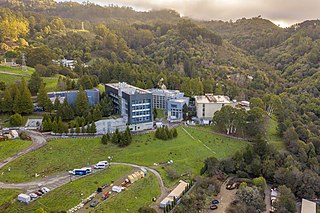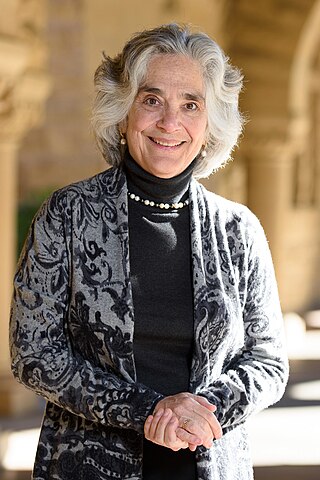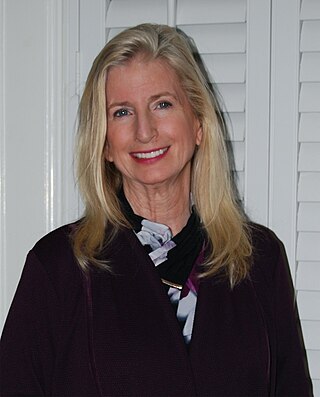
Lawrence Berkeley National Laboratory (LBNL) is a federally funded research and development center in the hills of Berkeley, California, United States. Established in 1931 by the University of California (UC), the laboratory is sponsored by the United States Department of Energy and administered by the UC system. Ernest Lawrence, who won the Nobel prize for inventing the cyclotron, founded the Lab and served as its Director until his death in 1958. Located in the Berkeley Hills, the lab overlooks the campus of the University of California, Berkeley.

Armand Paul Alivisatos is an American chemist and academic administrator who has served as the 14th president of the University of Chicago since September 2021. He is a pioneer in nanomaterials development and an authority on the fabrication of nanocrystals and their use in biomedical and renewable energy applications. He was ranked fifth among the world's top 100 chemists for the period 2000–2010 in the list released by Thomson Reuters.

Persis S. Drell is the Provost Emerita and the James and Anna Marie Spilker Professor in the Stanford University School of Engineering, a professor of materials science and engineering, and a professor of physics. Prior to her appointment as provost, she was dean of the Stanford School of Engineering from 2014 to 2017 and director of the US Department of Energy’s SLAC National Acceleratory Laboratory from 2007 to 2012.

Arlene Blum is an American mountaineer, writer, and environmental health scientist. She is best known for leading the first successful American ascent of Annapurna (I), a climb that was also an all-woman ascent. She led the first all-woman ascent of Denali, and was the first American woman to attempt Mount Everest. She is Executive Director of the Green Science Policy Institute.

The President's Council of Advisors on Science and Technology (PCAST) is a council, chartered in each administration with a broad mandate to advise the president of the United States on science and technology. The current PCAST was established by Executive Order 13226 on September 30, 2001, by George W. Bush, was re-chartered by Barack Obama's April 21, 2010, Executive Order 13539, by Donald Trump's October 22, 2019, Executive Order 13895, and by Joe Biden's February 1, 2021, Executive Order 14007.
The Presidential Early Career Award for Scientists and Engineers (PECASE) is the highest honor bestowed by the United States federal government on outstanding scientists and engineers in the early stages of their independent research careers. The White House, following recommendations from participating agencies, confers the awards annually. To be eligible for a Presidential Award, an individual must be a U.S. citizen, national, or permanent resident. Some of the winning scientists and engineers receive up to a five-year research grant.

Steven Chu is an American physicist and former government official. He is a Nobel laureate and was the 12th U.S. secretary of energy. He is currently the William R. Kenan Jr. Professor of Physics and Professor of Molecular and Cellular Physiology at Stanford University. He is known for his research at the University of California, Berkeley, and his research at Bell Laboratories and Stanford University regarding the cooling and trapping of atoms with laser light, for which he shared the 1997 Nobel Prize in Physics with Claude Cohen-Tannoudji and William Daniel Phillips.
Dian M. Grueneich is an American scholar and former public utilities commissioner. She served as a commissioner of the California Public Utilities Commission from 2005 until 2010. She is a senior research scholar at Stanford University's Precourt Institute for Energy.

David J. Hayes is an American attorney and legal scholar who serves in the Biden Administration as Special Assistant to the President for Climate Policy. Hayes has led White House work on clean energy deployment issues, climate resilience and greenhouse gas emission reduction and carbon sequestration initiatives. Hayes also has assisted in developing and implementing the climate-related provisions included in the Infrastructure Investment and Jobs Act and the Inflation Reduction Act.

Arunava Majumdar is a materials scientist, engineer, and the inaugural dean of the Stanford Doerr School of Sustainability. He was nominated for the position of Under Secretary of Energy in the United States between November 30, 2011 and May 15, 2012. He was previously the director of the Environmental Energy Technologies Division at the Lawrence Berkeley National Laboratory (LBNL), where he was also deputy director of LBNL as well as professor of mechanical engineering at the University of California, Berkeley. He was nominated to be the first director of the U.S. Department of Energy's Advanced Research Projects Agency-Energy (ARPA-E) and appointed to that position in September 2009.

Marilyn A. Brown is a Regents' and Brook Byers Professor of Sustainable Systems in the School of Public Policy at the Georgia Institute of Technology. She joined Georgia Tech in 2006 after 22 years at Oak Ridge National Laboratory, where she held various leadership positions. Her work was cited by President Clinton as providing the scientific justification for signing the 1997 Kyoto Protocol. With Eric Hirst, she coined the term "energy efficiency gap" and pioneered research to highlight and quantify the unexploited economic potential to use energy more productively.

Arati Prabhakar is an American engineer and public official. Since October 3, 2022, she has served as the 12th director of the White House Office of Science and Technology Policy and Science Advisor to the President.

John J. Berger is an environmental science and policy specialist, prize-winning American author, journalist, and environmental consultant. He has worked for the National Research Council of the National Academy of Sciences, Fortune 500 corporations such as Chevron, nonprofit groups, such as Friends of the Earth, and governmental organizations, including the Office of Technology Assessment of the United States Congress. He co-founded and directed the Nuclear Information and Resource Service as well as founding and directing the Restoring the Earth organization. Berger has authored and edited eleven books on energy and environmental issues, including Solving the Climate Crisis: Frontline Reports from the Race to Save the Earth,Climate Peril: The Intelligent Reader's Guide to Understanding the Climate Crisis, Climate Myths: The Campaign Against Climate Science, Restoring the Earth: How Americans Are Working to Renew Our Damaged Environment, and Charging Ahead: The Business of Renewable Energy and What It Means for America.

Katherine "Kathy" Anne Yelick, an American computer scientist, is the vice chancellor for research and the Robert S. Pepper Professor of Electrical Engineering and Computer Sciences at the University of California, Berkeley. She is also a faculty scientist at Lawrence Berkeley National Laboratory, where she was Associate Laboratory Director for Computing Sciences from 2010–2019.
Stacey Bent is a professor of chemical engineering and vice provost for graduate education and postdoctoral affairs (VPGE) at Stanford University. She is the Jagdeep and Roshni Singh Professor of Engineering, the Bert and Candace Forbes University Fellow in Undergraduate Education, and a member of the National Academy of Engineering. She was the director of the TomKat Center for Sustainable Energy and a senior associate dean in the Stanford School of Engineering until 2019. She is best known for contributions to semiconductor processing, materials chemistry, and surface science. Her work has been applied toward applications in semiconductors, solar cells, and catalysts.

Noël Bakhtian is the former director of the Berkeley Lab Energy Storage Center at Lawrence Berkeley National Laboratory. She has served as the director of the Center for Advanced Energy Studies at Idaho National Laboratory and as a senior policy advisor for the White House Office of Science and Technology Policy.

Yi Cui is a Chinese-American materials scientist, specializing in nanotechnology, and energy and environment-related research. Cui is the Fortinet Founders Professor of Materials Science and Engineering, and by courtesy, of Chemistry at Stanford University. He currently serves as the director of the Precourt Institute for Energy, succeeding Arun Majumdar and Sally Benson. He has been named the inaugural faculty director of the Sustainability Accelerator within the Stanford Doerr School of Sustainability. He also serves as a co-director of the Bay Area Photovoltaics Consortium, the Battery500 Consortium, and the StorageX initiative. He is a faculty member of Stanford Photon Science of SLAC, principal investigator at the Stanford Institute for Materials & Energy Sciences, and a senior fellow at Stanford Woods Institute for the Environment. He is an elected member of the National Academy of Sciences and European Academy of Engineering, and Fellow of the American Association for the Advancement of Science (AAAS), Materials Research Society (MRS), Electrochemical Society (ECS), and the Royal Society of Chemistry (RSC). He has been one of the world's most-cited researchers and most influential scientific minds. He has published over 560 research papers with an H-index of 265. He currently serves as the Executive Editor of Nano Letters from ACS Publications.

Ali A. Zaidi is a Pakistani-American lawyer and political advisor serving as the second White House National Climate Advisor since 2022. He was the New York deputy secretary for energy and environment. Zaidi held climate policy positions in the Obama administration including United States Domestic Policy Council deputy director for energy policy and associate director for natural resources, energy, and science at the Office of Management and Budget. Zaidi was a policy aide to U.S. Energy Secretary Steven Chu. He served as the first White House Deputy National Climate Advisor from 2021 to 2022.
The Stanford Doerr School of Sustainability is a school at Stanford University focusing on climate change and sustainability. The school also researches many domains of fossil fuel extraction and development. It opened on September 1, 2022, as Stanford's first new school since the School of Humanities and Sciences in 1948. It is considered one of the largest climate change–related schools in the United States.














